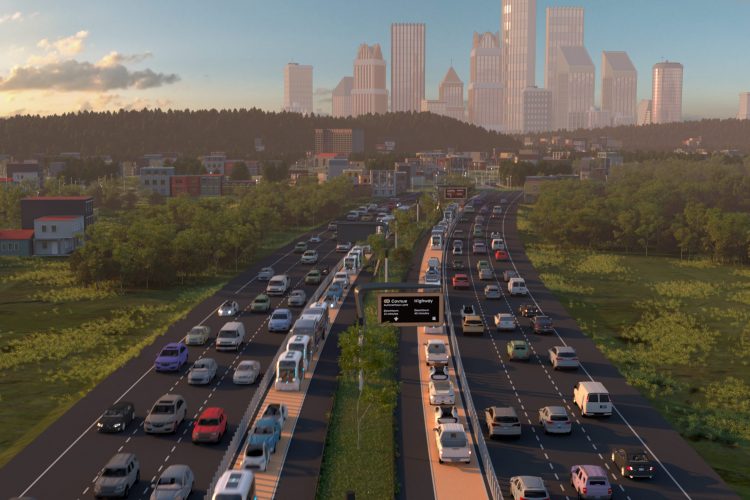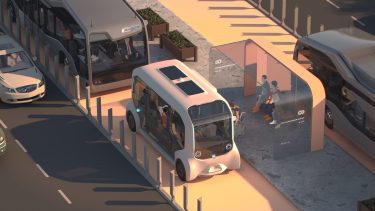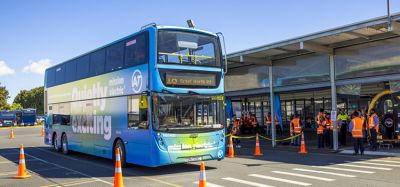Plans announced for autonomous vehicle corridor in Michigan
- Like
- Digg
- Del
- Tumblr
- VKontakte
- Buffer
- Love This
- Odnoklassniki
- Meneame
- Blogger
- Amazon
- Yahoo Mail
- Gmail
- AOL
- Newsvine
- HackerNews
- Evernote
- MySpace
- Mail.ru
- Viadeo
- Line
- Comments
- Yummly
- SMS
- Viber
- Telegram
- Subscribe
- Skype
- Facebook Messenger
- Kakao
- LiveJournal
- Yammer
- Edgar
- Fintel
- Mix
- Instapaper
- Copy Link
Posted: 17 August 2020 | Sam Mehmet (Intelligent Transport)
The vision for the corridor is to create lanes that are purpose built to accelerate and enhance the full potential of connected and autonomous vehicles (CAVs).


Artist rendition of corridor. Credit: Cavnue
U.S. Governor Gretchen Whitmer has announced an initiative to develop a “first-of-its-kind” corridor for connected and autonomous vehicles (CAVs) designed to improve transportation for communities in Southeast Michigan.
A key goal of the project will be to design the corridor with a focus on closing long-standing gaps in access to transit and transportation across the region. Cavnue, a subsidiary of Sidewalk Infrastructure Partners (SIP), has been selected by the state to serve as Master Developer of the autonomous corridor project. This public-private partnership will explore the opportunity and viability of this project working with state and local partners, stakeholders, and communities across the corridor from Detroit to Ann Arbor.
“The action we’re taking today is good for our families, our businesses, and our economy as a whole. Here in Michigan, the state that put the world on wheels, we are taking the initial steps to build the infrastructure to help us test and deploy the cars of the future,” said Governor Whitmer. “As we rebuild our roads to ensure every Michigander can drive to work and drop their kids at school safely, we will also continue working to build smart infrastructure to help prepare us for the roads of tomorrow. In Michigan, where the health of our workers and our economy are directly tied to the health of our auto industry, we will continue this innovative work to secure our state’s position as the automotive capital of the world.”


Credit: Cavnue
Cavnue will work with the Michigan Department of Transportation (MDOT), the Michigan Office of Future Mobility and Electrification, the Michigan Economic Development Corporation, the Michigan Department of Labor and Economic Opportunity (LEO) and industry and local project partners throughout Phase One of the effort, expected to last approximately 24 months.
Cavnue will also work with regional partners to plan, design, and develop the “world’s most sophisticated roadway”, combining innovations in physical, digital, coordination, and operational infrastructure to help increase the safety, efficiency, resilience and operations of roadways and autonomous vehicles, and improve the mobility experience for users.
At its core, the project is designed to be “future proofed” and evolve to meet transportation goals, beginning with connected buses and shared mobility vehicles such as vans and shuttles, and expanding to additional types of CAVs such as freight and personal vehicles. The project hopes to advance key policy goals, including improving safety, achieving neutrality among vehicle OEMs through standards-based approaches, enhancing accessibility, affordability, and equity, and aligning with regional planning, thus encouraging innovation, R&D, economic development, open data access and shared learnings, cybersecurity, and replicability.
Throughout the planning and development process, stakeholders will evaluate potential impacts on the transportation workforce and ensure that it supports good-paying jobs.
“As a company focused on the future of infrastructure, we are thrilled to launch Cavnue to build the future of roads, and partner with Michigan and the communities along the corridor on a first-of-its-kind CAV corridor,” said Jonathan Winer, co-founder and co-CEO of SIP.
“The time has come to start to integrate all of the momentum happening on the vehicle technology side with an equally strong push for innovation on our road assets themselves. We believe that combining technology and physical infrastructure can help unlock the full potential of CAVs and fundamentally transform mobility to improve safety, congestion, and public transit,” said Brian Barlow, co-founder and co-CEO of SIP.
“This project, and the decision by Cavnue and Sidewalk Infrastructure Partners to invest here, continues to reinforce that the future of mobility will be designed and built in Detroit and Southeast Michigan,” said Mayor Mike Duggan, Mayor of the City of Detroit.
Related topics
Connected & Autonomous Vehicles, Infrastructure & Urban Planning, Mobility Services, Transport Governance & Policy
Related modes
Autonomous vehicles
Related cities
Michigan
Related organisations
Cavnue, Michigan Department of Transportation (MDOT), Sidewalk Infrastructure Partners (SIP)
Related people
Brian Barlow, Gretchen Whitmer, Jonathan Winer, Mike Duggan








